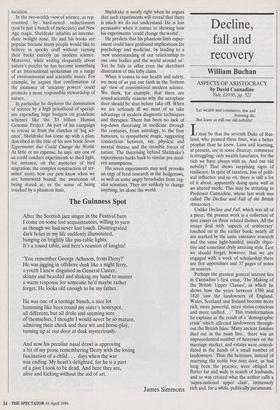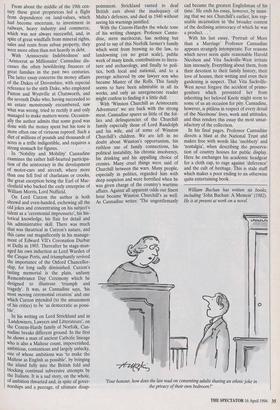Decline, fall and recovery
William Buchan
ASPECTS OF ARISTOCRACY by David Cannadine Yale, £19.95, pp. 321
Let wealth and commerce, law and learning die, But leave us still our old nobility!
It may be that the seventh Duke of Rut- land, who penned these lines, was a better prophet than he knew. Laws and learning, at present, are in some disarray; commerce is struggling; only wealth luxuriates, for the rich we have always with us. And our old nobility? That shows surprising signs of resilience. In spite of taxation, loss of polit- ical influence and so on, there is still a lot of it about, apparently doing quite well in an altered mode. This may be irritating to Professor Cannadine, whose last work was called The Decline and Fall of the British Aristocracy.
Unlike Decline and Fall, which was all of a piece, the present work is a collection of nine essays on three related themes. All the essays deal with 'aspects of aristocracy' touched on in the earlier book; nearly all are marked by the same extensive research and the same light-handed, usually objec- tive and sometime dryly amusing style. Lest we should forget, however, that we are engaged with a work of scholarship there are five appendixes and 37 pages of notes on sources.
Perhaps the greatest general interest lies in Cannadine's first essay, 'The Making of the British Upper Classes', in which he shows how the years between 1780 and 1820 'saw the landowners of England, Wales, Scotland and Ireland become more rich, more powerful, more status-conscious and more unified. . . ' This transformation he explains as the result of a 'demographic crisis' which affected landowners through- out the British Isles: 'Many ancient families died out in the main line... there was an unprecedented number of heiresses on the marriage market, and estates were consoli- dated in the hands of a small number of landowners.' Thus the heiresses, instead of marrying the noble boy next door, as had long been the practice, were obliged to flutter far and wide in search of husbands, and so was created what the author calls a `supra-national upper class', immensely rich and, for a while, politically paramount. From about the middle of the 19th cen- tury these great proprietors led a flight from dependence on land-values, which had become uncertain, to investment in railways, heavy industry and commerce, which was not always successful, and, in spite of great windfalls from mineral rights, sales and rents from urban property, they were more often than not heavily in debt.
With 'Aristocratic Indebtedness' and `Aristocrat as Millionaire' Cannadine dis- cusses the often bewildering finances of great families in the past two centuries. The latter essay concerns the money affairs of the Dukes of Devonshire, with especial reference to the sixth Duke, who employed Paxton and Wyatville at Chatsworth, and the seventh Duke who, having succeeded to an estate monstrously encumbered, saw what was wrong, tried to rectify it and only managed to make matters worse. Occasion- ally the author admits that some good was done with the money spent but his tone is more often one of virtuous reproof. Such a diet of millions of pounds and thousands of acres is a trifle indigestible, and requires a strong stomach for figures.
In 'Nobility and Mobility' Cannadine examines the rather half-hearted participa- tion of the aristocracy in the development of motor-cars and aircraft, where more than one fell foul of charlatans or crooks, the great exception being the Earl of Mac- clesfield who backed the early enterprise of William Morris, Lord Nuffield.
On Lord Curzon the author is both shrewd and even-handed, eschewing all the old jokes and concentrating on his subject's talent as a 'ceremonial impressario', his his- torical knowledge, his flair for detail and his administrative skill. There was much that was theatrical in Curzon's nature, and this came out magnificently in his manage- ment of Edward VII's Coronation Durbar at Delhi in 1903. Thereafter he stage-man- aged his own induction as Lord Warden of the Cinque Ports, and triumphantly revived the importance of the Oxford Chancellor- ship, for long sadly diminished. Curzon's lasting memorial is the plain, unfussy Remembrance Day Ceremony which he designed to illustrate 'triumph and tragedy'. It was, as Cannadine says, 'his most moving ceremonial creation' and one which Curzon intended (to the amazement of his critics) to be 'as democratic as possi- ble'.
In his writing on Lord Strickland and in `Landowners, Lawyers and Litterateurs', on the Cozens-Hardy family of Norfolk, Can- nadine breaks different ground. In the first he shows a man of ancient Catholic lineage who is also a Maltese count, impoverished, ambitious, contentious and largely unlucky, one of whose ambitions was 'to make the Maltese as English as possible', by bringing the island fully into the British fold and blocking continual subversive attempts by the Italians. It is a sad story, on the whole, of ambition thwarted and, in spite of gover- norships and a peerage, of ultimate disap- pointment. Strickland ranted to deaf British ears about the inadequacy of Malta's defences, and died in 1940 without seeing his warnings justified.
With the Cozens-Hardys the whole tone of his writing changes: Professor Canna- dine, stern meritocrat, has nothing but good to say of this Norfolk farmer's family which went from brewing to the law, to landowning (on no great scale), public work of many kinds, contributions to litera- ture and archaeology, and finally to poli- tics, both local and national, and to a peerage achieved by one lawyer son who became Master of the Rolls. This family seems to have been admirable in all its works, and only an unregenerate reader might confess to finding it a little dull. With 'Winston Churchill as Aristocratic Adventurer' we are back with the strong meat. Cannadine spares us little of the fol- lies and delinquencies of the Churchill family especially those of Lord Randolph and his wife, and of some of Winston Churchill's children. We are left in no doubt about Winston's opportunism, his ruthless use of family connections, his political instability, his chronic insolvency, his drinking and his appalling choice of cronies. Many cruel things were said of Churchill between the wars. Many people, especially in politics, regarded him with deep suspicion and were horrified when he was given charge of the country's wartime affairs. Against all apparent odds our finest hour became Winston Churchill's as well. As Cannadine writes: 'The ungentlemanly cad became the greatest Englishman of his time.' He ends his essay, however, by insist- ing that we see Churchill's earlier, less rep- utable incarnation in 'the broader context of the declining aristocracy of which he was a product. . . '
With his last essay, 'Portrait of More than a Marriage' Professor Cannadine appears strangely intemperate. For reasons which never seem quite reasonable Harold Nicolson and Vita Sackville-West irritate him intensely. Everything about them, from their devotion to their family history, their love of houses, their writing and even their gardening is suspect. That Vita Sackville- West never forgave the accident of primo- geniture which prevented her from inheriting her beloved Knole might seem to some of us an occasion for pity. Cannadine, however, is pitiless in respect of every detail of the Nicolsons' lives, work and attitudes, and thus renders this essay the most unsat- isfactory of the collection.
In his final pages, Professor Cannadine directs a blast at the National Trust and makes free with words like 'snobbery' and `nostalgia', when describing the preserva- tion of country houses for public display. Here he exchanges his academic headgear for a cloth cap, to rage against 'deference' and the cult of heritage. This is stale stuff which makes a poor ending to an otherwise quite entertaining book.
William Buchan has written six books, including 'John Buchan: A Memoir' (1982). He is at present at work on a novel.
Tour honour, how does the law read on consenting adults sharing an ethnic joke in the privacy of their own bedroom?'



























































 Previous page
Previous page